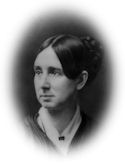![]()
[Robert and his family and Hatty and Carry were still in Europe, but hurrying their return on account of the breaking out of the war.]
![]()
New York, May 21, 1861.
Dear Girls: We hope soon to have more particulars about your interview with Mrs. Browning, what she said, and “said he” and “said they.”
I hardly know what to tell you about home. I have been trying to think what questions about public affairs you are longing to have answered, the whys and wherefores of things, but am afraid I might hit on the very wrong ones. We cannot see into details ourselves; we live only on newspaper rumors, and the only peace of mind we get is by mentally consenting to leave everything in the hands of Scott, satisfied of his patriotism, wisdom and skill. The best statesmanship of the country is at work for its good; many knowing heads are contriving and planning; many brave hearts and steady hands are executing the will of government; the monied men, who have so much to save or lose, feel that their only hope of extrication is in the vindication of our laws and constitution; the military men know the true weakness of the South and predict its ultimate ruin; and above all and over all, as Mr. Prentiss preached to us on Sunday, “this continent belongs to Christ. He has a greater stake in it than any of us, who are here only for our little day, can have. If it should be destroyed, where on earth has God such another country so suited to His great providential designs? Be sure He will see to it that America is delivered out of all her troubles in His own time.”
We hear the bugle-call now constantly floating down the streets. It is used as a rallying sound in the field — as in Europe —by the French and the German volunteers, and by some of our own regiments, I think. Going down Broadway you pass a great many “headquarters” or recruiting offices, and the crossed bayonets at the door or the sentry marching up and down have a very foreign look. You should see Charley in his Home Guard martial array. It is a sight to strike awe into feeble sisters— a grey tight-fitting coat, with red cuffs and collar edged with white cord, and a red and grey cap trimmed with white braid.
From Eliza and Joe at Albany we hear as follows: Joe was summoned there to report for duty, as the regiment is quartered in barracks, along with others, four thousand troops in all. The regiment and officers were sworn into United States service last Wednesday, drawn up in a long line, and the sound of their cheers rolling down the field like thunder. Two men refused to swear from some cause or other, and a third, who had hesitated but finally stepped into the ranks, was cheered by his comrades till the tears ran down his cheeks.
They say they are “able to lick their heft in wild cats “ and are pronounced the finest regiment so far accepted—all six feet or more high and experienced riflemen. Joe is well, so far, and busy, and does not for a moment regret the step he has taken. The duties of adjutant are honorable and responsible ones, and purely military.











